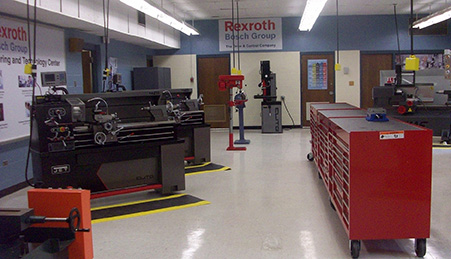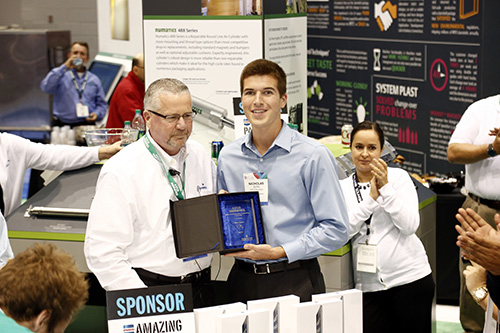Michelle DiFrangia • Assistant Editor
“Most education is theoretical; the practical application for what’s being taught never comes through.” — Larry Davis, President, Daman Products
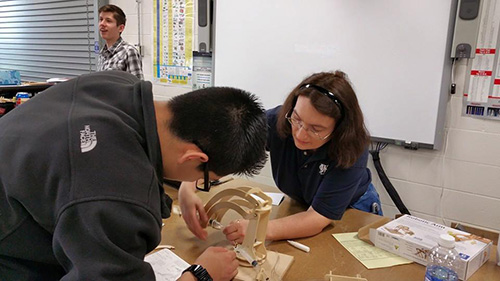
Antigone Sharris, seen here with a student from Leyden High School, volunteered to sponsor an SCC event at Triton College.
Davis’ quote applies to many industries besides fluid power. There needs to be a push toward hands-on project-based learning across all fields. “My experiences in college, what I remember, are the things where I was immersed in a project … as opposed to a professor standing in front of a class and explaining which of the then quadratic equations to use in various forecasting scenarios. I’d never remember that, but I did remember where I was immersed in a project,” said Davis.
That type of project-based learning is one of the key motivators behind programs like the NFPA’s Fluid Power Challenge. “There are a couple of things going on there,” Davis said. “One is to immerse kids in a project-based mechanical engineering and hydraulic project where they start to learn that learning about this stuff can be really fun. And those kids, on the day that the challenge occurs, after it’s all over and they’re ready to start the [competition], all their building is done, we ask them if they’ve ever done anything more difficult in school … they say, ‘No.’ And you ask them: Have you ever done anything that was more fun in school? And they say, ‘No!’ So it’s really neat stuff. To give kids the opportunity to learn the way they do during the Fluid Power Challenge is one thing, but we’re also trying to influence the teachers and demonstrate to teachers what project-based learning looks like and how impactful it can be.”
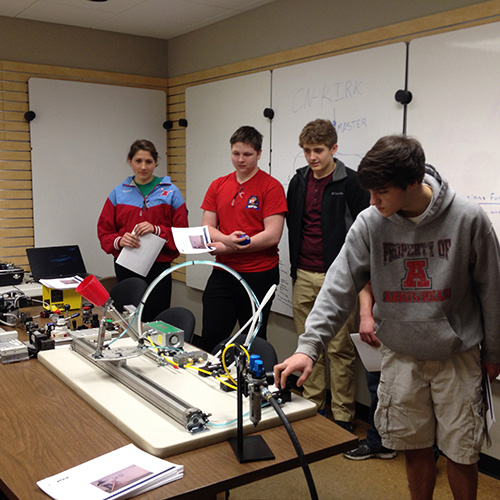
Students from Arrowhead High School worked together to assemble a fluid power classroom kit during the SCC program at Price Engineering.
“When it comes to who we want to hire,” he continued, “we’re hiring for values and intelligence and ability to problem solve and people who are energetic and want to work in teams … The values that come out of the Fluid Power Challenge, kids working together, learning about team dynamics, and not in a formal way, just trying to get something done with five kids and one of them doesn’t want to pull their weight, how difficult that is and those kinds of issues; it’s really powerful learning. [It] is an experience that they will remember for the rest of their lives and they’ll call on that in ways they can’t imagine throughout their careers. It stands in stark contrast to the talking head methodology of teaching.”
The Fluid Power Education Foundation (FPEF) encourages educators to become more involved in programs like the Fluid Power Challenge and others offered by the NFPA. “I believe that instructors should be informed about the new developments in fluid power and should do the best they can to become involved with fluid power organizations like NFPA or IFPS so that their teaching material is updated and their skills and knowledge are current,” said FPEF Trustee Jose Garcia, Certified Fluid Power Hydraulic Specialist and assistant professor at Purdue University.
“The technical stuff is easy to teach … It’s those soft skills, the ability to think, to reason and to compromise and find information, that’s what’s hard to teach. I should say, it’s hard to teach under the models we traditionally have tried to teach kids. There’s a way to do it, but I believe it’s project-based,” added Davis.
Fortunately, associations like the NFPA and its member companies, along with other companies in the industry, recognize the need for the immersive, project-based learning that Davis speaks so vehemently about, and they continue to develop a variety of programs aimed at middle school, high school and college level students to pique and sustain their interest in fluid power and technology in general.
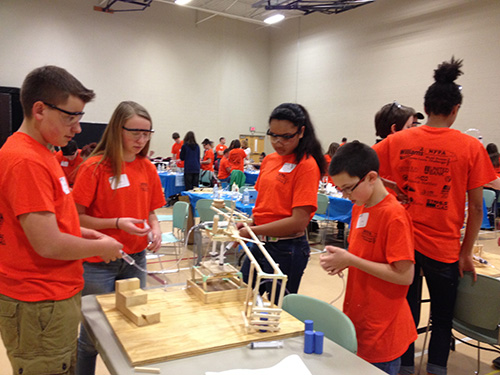
Teams participating in the Fluid Power Challenge are graded based on portfolio ideas, designs and teamwork, among other factors.
NFPA Fluid Power Challenge
During the Fluid Power Challenge, eighth-grade students work in teams to design and build a fluid power mechanism, then compete against each other in a timed competition. The entire event is divided into two portions: workshop day and challenge day.
On workshop day, teams build a pneumatic filter, developing skills needed for the competition. Afterward, students return to school with their workshop kits and spend several weeks preparing for the competition by working with the Challenge scenario, developing a portfolio, and building and testing a prototype of their mechanism.
The teams reconvene on Challenge day, when they must use the same tools and kits to recreate their mechanisms, which will be used to pick up a weighted object and place it on a platform.
“The Fluid Power Challenge is an excellent channel to attract the newer generations of engineers, technologists and technicians, not only in fluid power, but in STEM fields in general,” said Garcia.
In the first half of 2015 alone, nine events were held, seven of which were new, with a total of 634 students participating. South Milwaukee school held the first Fluid Power Challenge for high-school students—34 participated.
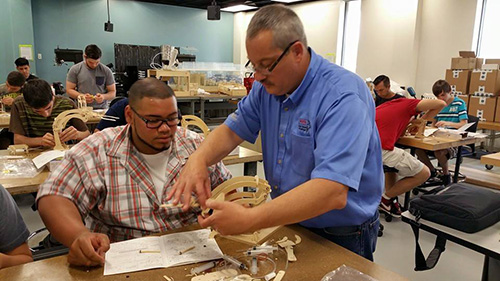
Bob Hammond (Deltrol Fluid Products) works with a student from Leyden High School to build a hydraulic robotic arm during the SCC event held at Triton College.
NFPA Career Connections
“The new NFPA Student Career Connections (SCC) program is an easy way for members to connect with students,” said Lynn Beyer, NFPA workforce program manager.
Overview of the SCC program:
• Students and teachers from local middle or high schools will get a tour of an NFPA member company.
• An employee from the company will speak to students about careers, what a day in the life is like, how to get into the industry and so on.
• Employees will work with students to put together a basic fluid power classroom kit.
• NFPA can provide teachers with fluid power curriculum that has been used in several PLTW (Project Lead the Way) schools before the group leaves.
The first SCC program took place in March at Price Engineering. A group of 30 students from Arrowhead High School toured the facility. Students worked with employees to put together a fluid power classroom kit. Through this visit, one student was offered an internship at Price.
The second event was held at Triton College in May. Thirty students from Leyden High School Industrial Technology Dept. met with Antigone Sherris, chair of the Triton College Engineering Dept., and Bob Hammond, manifold and systems engineering manager at Deltrol Fluid Products. Together, Sherris and Hammond spoke to the students about careers in fluid power and why this pathway is a great decision that leads to many promising opportunities.
Companies contributing to education
Bosch Rexroth recently supplied a funding grant of $80,000 to the Olympic Community of Schools in Charlotte for the new Advanced Manufacturing and Technology Center. High-school students will gain hands-on experience using state-of-the-art manufacturing equipment, including milling machines, saws and grinders, metal-cutting and finishing technology, and quality-control stations. It opened for students at the start of the fall semester.
This isn’t the first time Bosch has contributed to an educational program. The company has several apprenticeship programs established throughout Germany. “Children are made aware of the career possibilities early in life and the structure has been well established to support the development of it, no matter [the] technical area,” said Mark Rohlinger, technical plant manager, Bosch Rexroth. “A good local apprenticeship program needs to be available and supported by local advanced manufacturers, and also by the local community colleges and universities. … To create the awareness early on … it needs to extend down into the K–12 grades,” he continued.
“That is why we are teaming up with other local manufacturing companies to develop a common on-going program for students to get into. One of the main goals is to … get more and more students interested and filling seats at the local colleges and universities. This then also supports all the local manufacturers, our suppliers and other business partners who may not be able to support an apprenticeship themselves, but most likely will have the need for skilled workers at some time.”
In Cincinnati, Hydrotech, a fluid power and motion automation solutions provider, also recently donated four brand-new hydraulic training stands to Cincinnati State Technical and Community College. Between 300 and 350 students will use these stands per year.
The training assemblies, valued at $30,000 per unit, will be used by students in Cincinnati State’s Electro-Mechanical Engineering Technologies program. In 2014 the company donated pneumatic training stands to the same program.
“These students may be working for us someday or for one of our local clients or partners,” said Pete Jones, Hydrotech CEO. “It’s a blessing to us that we can help them develop the crucial skills necessary to be successful.”
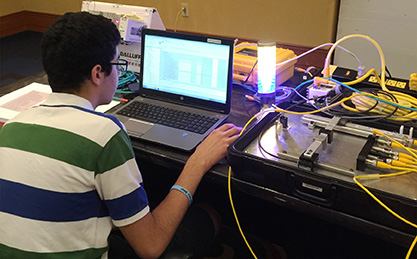
A student participates in one of six hands-on labs offered during Balluff’s Sensing Technologies training course.
Educating students on sensing technology
Balluff is involved in on-going fluid power education in a number of ways. The company donates to myriad university programs’ laboratories, including a donation of sensing equipment for process control, such as linear transducers, pressure sensors and capacitive sensors. Balluff also supports several STEM initiatives in local communities and participates in TECHFIT (Teaching Engineering Concepts to Harness Future Innovators and Technologists) programs at Purdue University and The College of Charleston. Lastly, the company offers a paid training class on sensor fundamentals, including fluid power related technologies like magnetic field sensors, proximity sensors and linear position sensors.
In July, this class was offered to six students from North Cobb Christian High School in Atlanta. The students were a part of the school’s Math, Science and Technology Academy. Students participated in hands-on labs that dealt with object detection, linear position management and I/O-Link technologies, as well as basic programming.
Through a partnership with Gateway Community College and PLTW, Balluff also hosted 30 students from Grant County Middle School in Kentucky this past April.
Students participated in tours of the manufacturing facility, technical labs and logistics center; product demonstrations; and a Q&A session with several engineers and marketing managers. “We spent time discussing … how sensors play a vital role in automating the [manufacturing] process,” said Will Healy III, strategic marketing manager and coordinator of the event. “The students saw real-world examples of how this can be applied in laboratory automation, automotive, metal working, welding, robotics, timber, packaging and assembly. They received basic instruction on the principles of inductive, capacitive, photoelectric and cylinder sensor technology.”
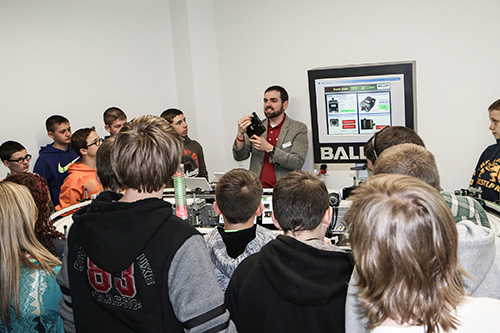
While touring Balluff, students from Grant County Middle School learned how industrial electronics are manufactured, the basics of logistics and about the various career opportunities available in manufacturing.
Healy said future plans might incorporate more hands-on experience by hooking up and using the sensors in a few on-site applications.
“We would happily offer this as an on-going program targeted at middle school, high school or college-level students … and we recognize that inciting interest in STEM careers is a vital activity for our industry,” said Healy.
“Our goal is to excite our local students about manufacturing and to spark interest for their future plans through education and the workforce,” added Leah Cridlin, Balluff’s training and development specialist, who also helped coordinate the event.
Career Exploration Day
Approximately 600 middle and high school students attended the first Career Exploration Day at Northfield Middle School on May 19. The event, organized by FORCE America CEO John Stenz and his team, featured booths and displays provided by roughly 30 area businesses and organizations. Inside the school students could try out the NFPA’s hydraulic excavator, see videos of the Fluid Power Challenge and use FORCE America’s joystick and spreader control system like a video game to control a snow fighting vehicle. Outside, they could sit in the cab of a road grader or a dump truck and drive a dune buggy.
ASCO Numatics Engineering Scholarship
Over the past eight years, ASCO Numatics has awarded $70,000 in scholarships to 14 students (two per year). In addition, it has provided another $14,000 in grants to 12 U.S. schools of engineering. Each $5,000 scholarship goes directly toward students’ tuition.
“Scholarships are merit-based and awarded on the candidate’s potential for leadership and making a significant contribution to the engineering, instrumentation, systems and automation professions, particularly as they relate to the application of fluid control and fluid power technologies,” the website states.
Careers in distribution
Industrial Careers Pathway (ICP) is a program of an alliance of seven trade associations, one of which is NAHAD, who work together to drive the programs that will build awareness of the careers available in industrial distribution. “Our focus is on raising awareness of the incredibly rewarding careers in the field to 16 to 24 year olds who are mechanically inclined, like to work with their hands, enjoy working with people and who are not seeking a four-year college degree,” said Mary Jawgiel, ICP program manager.
Continuing efforts
“As long as I’ve been hiring people and been in manufacturing, my colleagues have complained about the basic skills of people coming out of high school,” said Davis.
According to a 2014 Manufacturing Skills and Training Study conducted by Accenture in conjunction with The Manufacturing Institute, Davis and his colleagues are not alone. More than 75% of manufacturers nationwide report a moderate to severe shortage of skilled resources.
“But simply complaining about it doesn’t help; you have to be able to provide a model or idea on how it can be better,” he continued.
As demonstrated by the many programs already implemented, now more than ever, employers and educational institutions are working together to ensure students are graduating with the proper knowledge and skill set to succeed in the workforce. In addition, these programs help spark a genuine interest in fluid power and related technologies in the next generation of engineers.
“Getting kids excited about learning is the ticket,” Davis concluded.
Filed Under: Fluid Power World Magazine Articles
